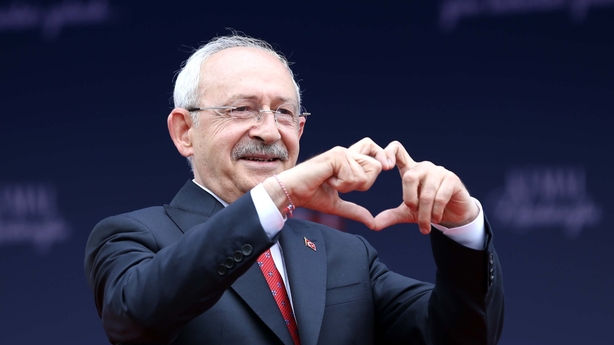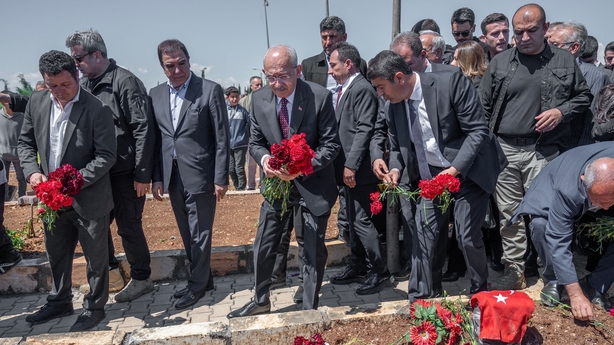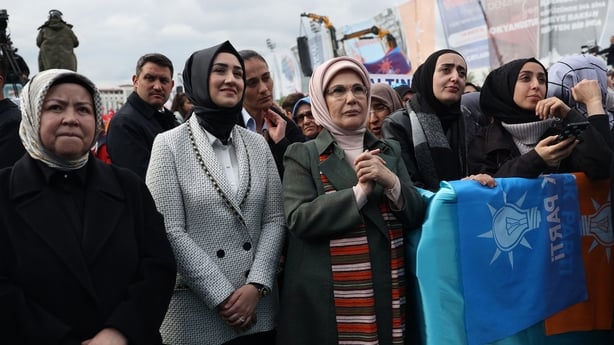Turkey's President Recep Tayyip Erdogan faces the toughest challenge to his leadership in two decades as Turks vote on Sunday in the country’s presidential and parliamentary elections.
Six parties have grouped behind the main opposition candidate, 74-year-old Kemal Kilicdaroglu, a secular moderate, in a bid to oust Mr Erdogan from the presidency and defeat a nationalist alliance led by his AK party in Turkey’s 600-seat parliament.
The latest poll by Turkish pollster, Konda, shows support for Mr Kilicdaroglu at 49%, with Mr Erdogan at just under 44%.
Two key issues have dominated the campaign in the country of 85 million: democratic freedom and an ailing economy. Officially, Turkey’s annual rate of inflation stands at 43%, though many believe it to be much higher.
Mr Erdogan has dominated Turkish politics for the past two decades, serving as prime minister from 2003, before becoming president in 2014.
In 2017, one year after a failed coup by generals against his rule, Mr Erdogan and the AK won a referendum to abolish the role of prime minister, and consolidate power under the office of the president.
He has reduced the independence of Turkey’s judiciary and cracked down on media freedom, jailing dissidents and journalists for their criticism of his authoritarian-style rule. Mr Erdogan has also maintained friendly relations with the Kremlin, despite Turkey being a NATO member.
"This country has had noticeable democratic backsliding, an authoritarian lurch that affects people’s lives, particularly young people," Asli Aydintasbas, a former political commentator for CNN Turk, told RTÉ News.
"The opposition coalition have made a compelling enough case that Turkey's economic problems are, in large part, a function of its governance model, what they call 'one man regime’, that in order for the economy to improve, we also need Turkish democracy to improve [and] return to democracy," said Ms Aydintasbas, currently a visiting fellow at Brookings Institution.
Mr Erdogan and his AK party campaign on a platform of defending Muslim values, breaking from the Turkish republic’s secular roots, established by its first president, Mustafa Kemal Ataturk, a century ago.
Under Mr Erdogan’s new centralised system of power, the autonomy of the country’s central bank has been eroded, and the president has pursued an unorthodox policy of keeping interest rates low – currently 8.5% – while the economy struggles with high inflation.
His supporters say that under the president’s leadership, Turkey has become a regional power.

Mr Kilicdaroglu, by contrast, is a secularist.
A soft spoken bureaucrat, he has led the centre-left Republican People’s Party through a decade of electoral defeats at the hands of the AK.
In 2017, following the previous year’s failed coup, he walked from Istanbul to Ankara carrying a sign which read ‘Justice’. He was demanding justice for activists who were arrested following the coup.
The six parties backing Mr Kilicdaroglu make up a motley crew of secularists, Islamists, conservatives and nationalists, and have placed the heart symbol at the centre of their campaign, offering a message of positivity.
The opposition want to re-establish the office of prime minister and abolish the presidential veto, in effect, reducing the executive powers of the president implemented by Mr Erdogan.
They also want to return more control to the Turkish central bank so it can shape fiscal policy without the interference of government, and introduce new councils to make sure tax money is spent properly, promising to crack down on corruption.
Mr Kilicdaroglu has said that he will push to restart accession talks with the EU, which have been, in effect, frozen since 2015. In general, he promotes a pro-Western outlook.
Turkey is home to almost 4 million Syrian refugees and their future in the country has become a campaign issue.
Mr Kilicdaroglu, along with most of the opposition parties – the exception being the pro-Kurdish HDP – are proposing to repatriate Syrian refugees. The AK party has not proposed this measure.

The devastating earthquakes in February, which caused the deaths of more than 50,000 people and, left millions homeless, dented support for Mr Erdogan and the AK party.
"The whole presidential system was sold in the referendum [so] that we would have a much more effective system. But, with the earthquake, we saw that the bureaucracy didn’t work," Professor Cigdem Ustun, a political scientist, told RTÉ News.
"Every single decision had to be OK’d by the president’s office and the presidential system has not delivered on what was promised. When the state could not respond, civil society responded more quickly," said Prof Ustun, secretary-general of EDAM, an Istanbul-based political think tank.
The battle for control of parliament looks tight too.
A survey by Konda, a Turkish pollster, on the standing of political parties placed support for AKP at 44%, ahead of the main opposition alliance on 40%.
The pro-Kurdish HDP party, which currently holds 10% of seats in parliament, may end up playing the role of kingmaker. The HDP is informally backing Mr Kilicdaroglu for president.

On Thursday, one of the presidential candidates dropped out of the race, giving Mr Kilicdaroglu a slight boost in the polls.
If a presidential candidate does not gain 50% of the vote in Sunday’s first-round vote, a second-round vote will be held on 28 May. Polling suggests that a second round run-off between Mr Erdogan and Mr Kilicdaroglu would go to the wire.
Mr Erdogan has won the past two presidential and five parliamentary elections. Even if he loses this time, he is unlikely to disappear from Turkish politics.
Ms Aydintasbas said that there is a "very palpable" sense that a majority of voters want change, but that it was unclear if Mr Kilicdaroglu is "the agent of that change".
"What is clear, is that President Erdogan is facing an anti-Erdogan majority."






